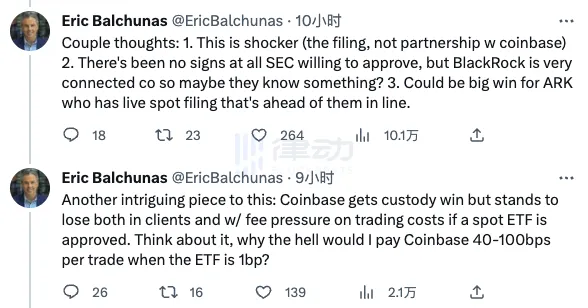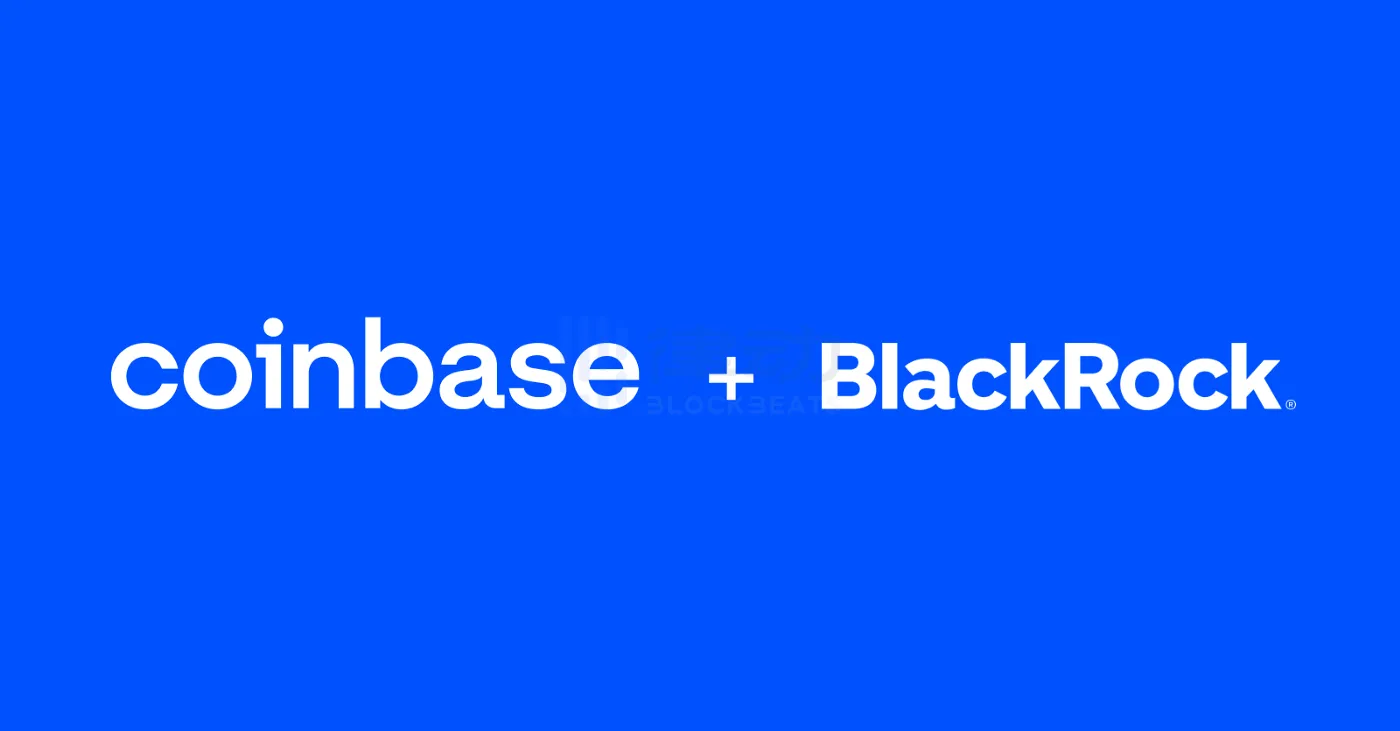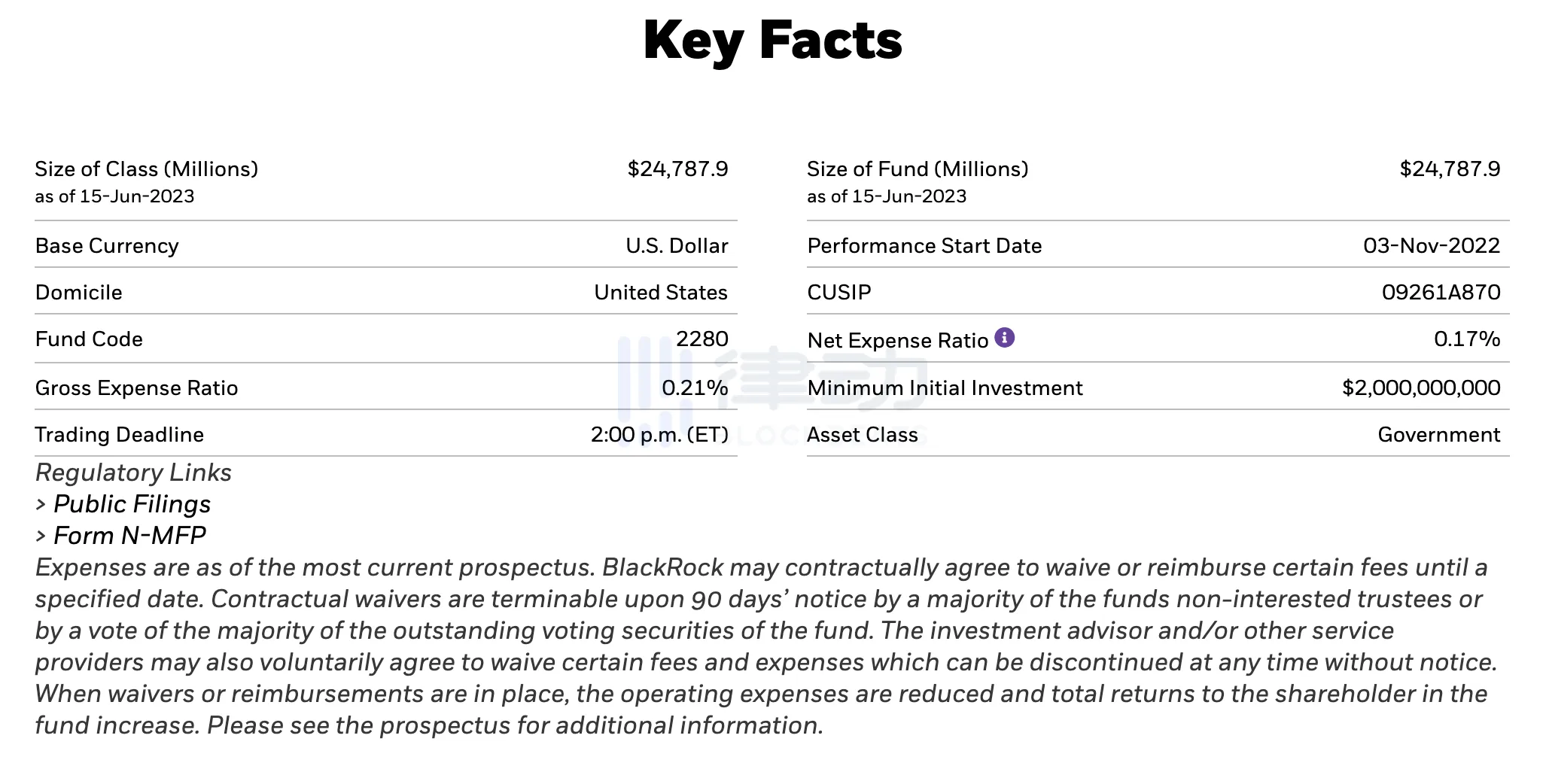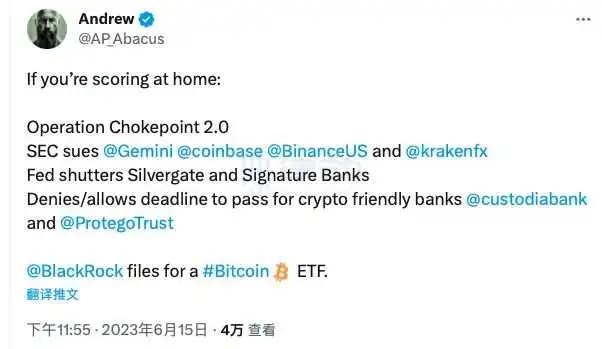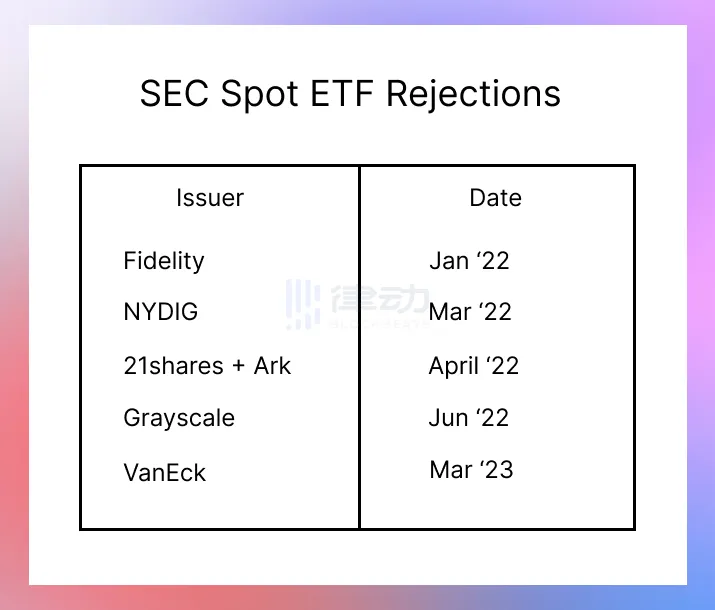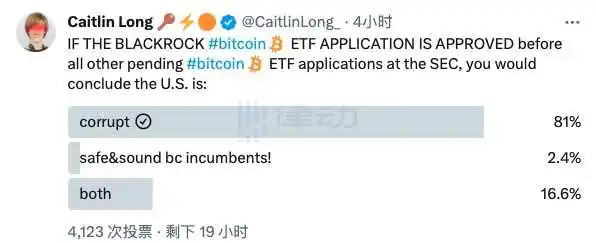Why did the crypto community react negatively to BlackRock’s “wind-facing” application for a Bitcoin ETF?
Why did the crypto community react negatively to BlackRock's Bitcoin ETF application?Authors: Jaleel, Jack, BlockBeats
Editors: Jack, BlockBeats
This morning, BlackRock, one of the largest asset management companies in the world, submitted an application for a Bitcoin ETF to the US SEC through its subsidiary iShares, which has attracted a lot of attention in the English-speaking community. According to the application, the ETF is named “iShares Bitcoin Trust” and its assets are mainly composed of Bitcoin held by the trustee representing the trust, with the “trustee” being Coinbase, which provides custody through a cryptocurrency trading platform.
In the face of intense SEC regulatory pressure and the fact that many physical Bitcoin ETFs have not been approved, the application for a Bitcoin ETF from the world’s largest asset management giant is surprising. Jake Chervinsky, advisor to Variant Fund and practicing lawyer (@jchervinsky), wrote on Twitter: “The SEC has been resolutely refusing to approve physical Bitcoin ETFs for many years, and this attitude is deeply ingrained. Knowing that the SEC has a negative attitude towards this, BlackRock still hopes to list a Bitcoin ETF on Nasdaq. We all know how important this is, don’t we?”
- Arthur Hayes’ Blog: US Regulatory Pressure Intensifies, Hong Kong Welcomes Cryptocurrency – What Does This Mean?
- Why is the cryptocurrency community generally negative about applying for a Bitcoin ETF under the supervision of BlackRock?
- What does it mean when people say USDT is decoupling?
As an asset management company with assets under management exceeding $10 trillion, BlackRock’s assets are even larger than Japan’s GDP of $4.97 trillion in 2018. BlackRock, Vanguard Group, and Charles Schwab Bank were once known as the “three giants” that control the entire index fund industry in the United States. Therefore, BlackRock’s filing of an application for a physical Bitcoin ETF with the US SEC has caused quite a stir in the community.
BlackRock applies for Bitcoin ETF, crypto community reacts negatively
Although BlackRock’s physical ETF application is a huge boon for the industry, some crypto industry practitioners do not seem to support BlackRock’s application for a physical Bitcoin ETF. According to the rules of physical Bitcoin ETFs, the fund company is responsible for buying, selling, and storing physical Bitcoin and creating corresponding ETF shares for trading on stock exchanges. Therefore, Bitcoin ETFs are only assets that track Bitcoin prices, and investors who purchase Bitcoin ETFs indirectly invest in Bitcoin, holding tradable Bitcoin fund shares rather than holding Bitcoin directly. This to some extent violates the spirit of crypto: “Your keys, your bitcoin. Not your keys, not your bitcoin.”
BlockBeats found that most English-speaking communities did not view BlackRock’s Bitcoin ETF application as a positive signal, despite the company’s defiance of regulatory pressure. In Twitter comments about the Bitcoin ETF application, phrases such as “traditional financial giants,” “financial elites,” and even “Operation Choke Point 2.0” appeared frequently.
AutismCapital (@AutismCapital), a well-known KOL, believes that BlackRock’s decision to launch an ETF under the regulatory pressure of the U.S. Securities and Exchange Commission (SEC) may indicate that the SEC is conducting a cleanup operation. The goal is to remove “low-level scammers” from the cryptocurrency field, making it easier for “elite giants” in traditional U.S. finance to rebuild a game platform according to their own rules.
Hsaka (@HsakaTrades) listed several events in which traditional financial giants entered the cryptocurrency industry, implying that BlackRock’s application for a Bitcoin ETF has “giant financial” attributes:
-BlackRock’s application for a spot Bitcoin ETF;
-Soros Fund Management said the timing was right for TardFi to acquire cryptocurrencies;
-EDX, a cryptocurrency exchange supported by Citadel, is rumored to be launching later this year;
Earlier, Dawn FitzBlockingtrick, CEO of Soros Fund Management, said at the Bloomberg Investment Summit that the time was right for traditional finance (TradFi) to acquire encryption technology. Dawn FitzBlockingtrick said that cryptocurrency will continue to exist, and it is a huge opportunity for existing traditional finance companies to lead the industry. In addition, financial giants such as Citadel Securities, Charles Schwab, and Fidelity Digital Assets announced the launch of the cryptocurrency exchange EDX Markets, which many believe is the latest evidence of Wall Street’s progress in digital assets during the cryptocurrency winter.
Scimitar Capital partner thiccy (@thiccythot_) pointed out that the U.S. Securities and Exchange Commission has approved quite a few Bitcoin futures ETFs, but not spot ETFs. The asset management scale of spot ETFs traded on the U.S. stock market is currently very small. In thiccy’s view, spot ETFs are “garbage,” and the U.S. Securities and Exchange Commission has long denied spot ETFs, citing concerns about market manipulation and a lack of supervision-sharing agreements between “large regulated markets” and regulated exchanges. “This concern is somewhat justified because Coinbase and other U.S. exchanges account for less than 10% of Bitcoin spot trading volume,” thiccy wrote in a tweet.
Senior ETF analyst at Bloomberg Eric Balchunas (@EricBalchunas) believes there is no sign that the SEC will approve the application, but given BlackRock’s close relationship with them, perhaps BlackRock knows something? Another interesting point is that if the ETF is approved, Coinbase will lose the pressure of customer and trading costs that it currently has as a custodian. Think about it, why would I pay Coinbase 40-100 basis points per transaction when the ETF is 1 basis point?
The real regulars are coming in?
BlackRock’s application for a bitcoin spot ETF is not without precedent. As early as the beginning of 2021, BlackRock CEO Larry Fink publicly stated that he “is optimistic that bitcoin will become a global market asset,” and Rick Rieder, the firm’s chief investment officer in fixed income, later said that BlackRock has begun to get involved in bitcoin.
That same year, BlackRock said that its global allocation fund had acquired some bitcoin risk exposure through CME bitcoin futures issuance. BlackRock’s two fund companies, the “BlackRock Global Allocation Fund” and “BlackRock Funds V,” stated in their investment prospectuses submitted to the SEC that some of their funds could participate in bitcoin futures contract trading. The prospectus also stated that not all bitcoin futures contracts are investable, but only those registered with the U.S. Commodity Futures Trading Commission (CFTC) and settled in cash.
Image source: BlackRock Funds V 497 Prospectus
Interestingly, BlackRock’s collaboration with Coinbase is not the first time it has worked with the crypto establishment.
BlackRock’s past collaborations with the “cryptographic regulars”: Coinbase and Circle
On August 4, 2022, BlackRock announced an agreement with the crypto exchange Coinbase to provide cryptocurrencies to institutional investors, starting with bitcoin. According to Coinbase’s blog post, BlackRock will use Coinbase Prime to provide the service, which will allow its Aladdin institutional clients to access crypto trading, custody, primary brokerage, and reporting capabilities.
On August 11 of the same year, BlackRock launched a private trust to provide US institutional clients with exposure to spot bitcoin. The trust will be offered to institutional clients in the US and will be BlackRock’s first product to directly touch the bitcoin price. In a statement, BlackRock said, “Despite the sharp decline in the digital asset market, we continue to see strong interest from some institutional clients in how to efficiently and cost-effectively gain exposure to these assets using our technology and product capabilities.”
As for Circle, the issuer of USDC, BlackRock participated in a $400 million financing round of Circle in the second quarter of 2022. Circle also invested most of its reserve funds in the Circle Reserve Fund, a government currency market fund managed by BlackRock. As of the time of writing, according to BlackRock’s and Circle’s official pages, the Circle Reserve Fund has assets under management of $24.787 billion, accounting for about 86% of Circle’s total reserve funds ($28.5 billion), with the remaining funds temporarily held as bank deposits.
In January of this year, the well-known financial think tank the Bank Policy Institute (BPI) published a research article pointing out that USDC may become a “backdoor central bank digital currency” with the help of BlackRock.
The research found that BlackRock has planned to apply for permission for the fund to use the Federal Reserve’s overnight reverse repurchase agreement facility (ON RRP). Once approved, this means that anyone who wants to hold an equivalent reserve of US dollars with the Federal Reserve can do so by buying USDC, making USDC a “backdoor CBDC” that anyone in the world can use to conduct ON RRP in the Federal Reserve system.
Previously, BlockBeats reported that the trading pair used by both sellers and arbitrageurs in the recent FUD encountered by USDT in Curve 3pool was USDC. (Related reading: “USDT faces serious sell-off, are market makers exiting?”)
Operation Choke Point 2.0
In the discussion about BlackRock’s spot ETF application, another popular opinion in the community is “Operation Chokepoint 2.0.” Well-known KOL and serial entrepreneur Andrew (@AP_Abacus) pointed out the subtle timing of BlackRock’s ETF application in his own tweet:
-The U.S. Securities and Exchange Commission has sued four large cryptocurrency exchanges, including Gemini, Coinbase, Binance US, and Kraken. This means that they may be under investigation for allegedly violating U.S. securities trading regulations.
-At the same time, the Fed closed Silvergate Bank and Signature Bank, two well-known banks that provide services to the cryptocurrency industry.
-In addition, the Fed is deciding whether to approve the requests of two crypto-friendly banks, Custodia Bank and Protego Trust.
-And at this time, BlackRock is beginning to apply for a Bitcoin ETF.
Since February of this year, rumors about U.S. authorities strengthening regulation have been increasing. First, Coinbase CEO Brian Armstrong revealed that there were rumors that the U.S. SEC might ban cryptocurrency collateral services for retail investors. Then, multiple sources said that the Fed and financial regulators were taking massive action to pressure banks, preventing crypto companies from obtaining bank accounts, and cutting off the connection between cryptocurrencies and banks.
In March, several U.S. banks were forced into bankruptcy liquidation. Afterwards, it was discovered that several banks that were liquidated, including Signature Bank, Silicon Valley Bank, and Silvergate Bank, were all cryptocurrency-friendly banks. A significant portion of Signature Bank’s daily business is related to the cryptocurrency industry. Many people believe that the Biden administration is now executing a coordinated plan across multiple agencies to cut off the funding channels between banks and crypto companies, and this trend is called “Operation Chokepoint 2.0.”
The term “Operation Chokepoint 2.0” comes from a DOJ plan launched in 2013 to combat fraud and illegal activities such as money laundering and drug trafficking. The U.S. government puts pressure on banks that have business dealings with high-risk merchants to prevent certain companies from obtaining financial services. This measure sparked controversy at the time because it led to many legally but deemed high-risk companies suffering severe liquidity crises. This action was also seen as an Obama-era movement to cancel legitimate but politically unpopular banking business.
Following the bankruptcy of several crypto-friendly banks, US crypto companies seem to have become “homeless” in terms of banking services. According to CoinDesk, most banks remain silent on this issue, and some banks have explicitly stated that they are not willing to accept crypto customers. (Related reading: “Is the US launching a ‘whole-of-government’ attack on the crypto industry and are crypto resources fleeing?”)
Will Clemente, co-founder of digital asset research firm ReflexivityRes, tweeted that if BlackRock’s spot ETF application is approved, “Operation Choke Point 2.0” is likely to be a well-planned effort aimed at driving out native crypto companies and introducing large traditional companies partnering with the US government to control bitcoin and cryptocurrencies.
Of course, these views are one-sided speculations of the community and there is no official document as actual evidence.
Can BlackRock’s spot ETF application be approved?
Another topic that has sparked community discussion is whether BlackRock’s bitcoin ETF can be approved. Earlier, the SEC approved some futures-based bitcoin ETFs, but it has never approved attempts to open spot bitcoin ETFs, including Jacobi Asset Management, Bitwise, Valkyrie, Kryptoin, SkyBridge, NYDIG, GlobalX Digital Assets, One River, WisdomTree, etc.
Last year, Cathie Wood’s Ark Investment Management and Swiss investment product provider 21Shares attempted to list a bitcoin spot ETF in the United States, but were rejected. The two companies then resubmitted an application in May, and were rejected again, with the reason being that “the Cboe BZX Exchange, on which the ETF is planned to be listed, failed to demonstrate that its proposal meets the SEC’s requirements to prevent fraud and other malicious acts.”
Image source @thiccythot_
In October 2021, Grayscale also submitted a 19b-4 filing to the US SEC to apply for a bitcoin spot ETF, hoping to convert GBTC into a bitcoin spot ETF, but was also rejected. SEC Commissioner Mark Uyeda said during the Singapore ICI Global Asset Management Asia Forum that “so far we have received a lot of applications, none of which have been approved.” Uyeda said that the SEC will consider the applications based on their “actual situation.”
After Grayscale’s grayscale application was rejected, it even entered into court debates with the SEC at the Columbia District Court. The SEC believes that Bitcoin futures ETFs are more resistant to manipulation than the spot market, and uses this as one of the reasons for rejecting Grayscale’s spot ETF application. Judge Rao questioned this: “SEC needs to explain how it understands the relationship between Bitcoin futures and spot prices. A futures contract is essentially a derivative. They are together 99.9% of the time, so in SEC’s view, what is the difference between the two?” The SEC also argues that “99% correlation does not equal causation, futures data only refers to daily prices, not intraday prices. In SEC’s view, the Bitcoin spot market is indisputably decentralized, in sharp contrast to Bitcoin futures traded only on the Chicago Mercantile Exchange (CME).”
So far, the SEC has not approved any Bitcoin spot exchange-traded funds (ETFs) for listing. Therefore, VanEck CEO Jan believes that investors are unlikely to see Bitcoin spot ETFs in the US anytime soon, and perhaps not even in the next year and a half. Interestingly, the founder and CEO of CustodiaBank also initiated a vote:
If the application for BlackRock’s Bitcoin spot ETF is approved, what do you think of the US government?
1. Corrupt;
2. Diligent and problem-free
Among them, more than 80% of voters believe that if the application of this ETF is approved, it will further reflect the corruption of the US authoritative department.
On the issue of “whether BlackRock’s application will be approved,” Scimitar Capital partner thiccy (@thiccythot_) believes that as the largest and most respected asset management company, BlackRock may establish a special relationship with the SEC. In addition, the pressure from the Republican Party on Gensler is increasing, and the SEC may make some arbitrary decisions. In thiccy’s view, if BlackRock’s ETF is approved, it will be a huge driving force for the cryptocurrency industry.
We will continue to update Blocking; if you have any questions or suggestions, please contact us!
Was this article helpful?
93 out of 132 found this helpful
Related articles
- News Weekly | US judge denies SBF’s request for prosecutor to review FTX debtor’s request
- Is BlackRock applying to the SEC for a Bitcoin ETF or a trust?
- Why did the SEC reject the approval of a bitcoin ETF for spot trading? Will BlackRock’s attempt be successful this time?
- Inscription 2.0 Era: Can Recursive Inscriptions Push Bitcoin On-Chain Smart Contracts to be Possible?
- Reasons behind the slight USDT deviation in data analysis: Market FUD causing significant decrease in 3Pool liquidity on Curve. Author: Joy. Summary: Following SEC’s lawsuit against Binance and Coinbase and two Korean crypto agencies temporarily suspending user withdrawals, USDT has once again deviated. Written by Joy at BlockingNews.
- What impact does BlackRock’s submission of a physical Bitcoin ETF application have on the industry?
- Age of Inscription 2.0: Can Recursive Inscription Enable Bitcoin On-Chain Smart Contracts?

